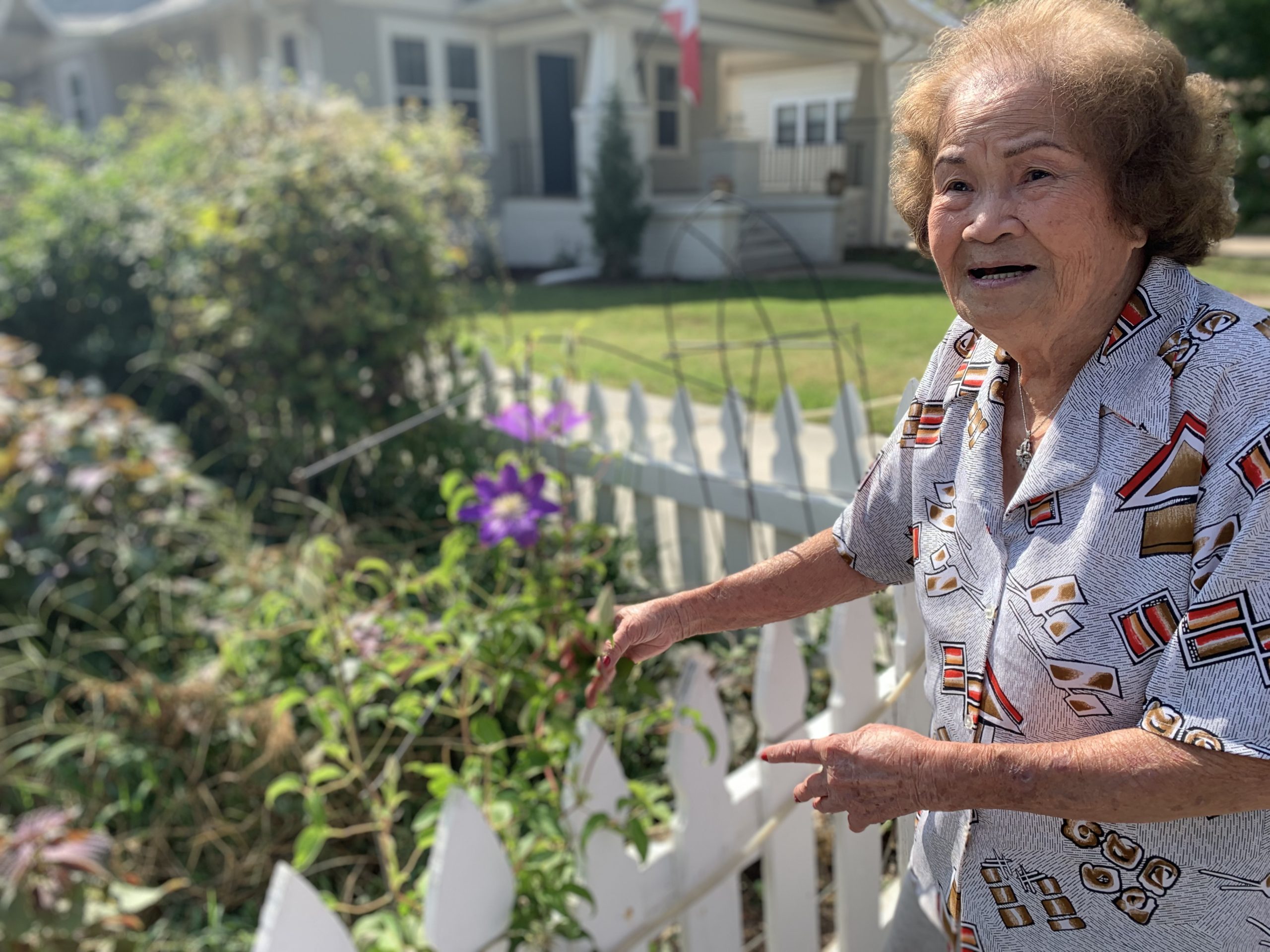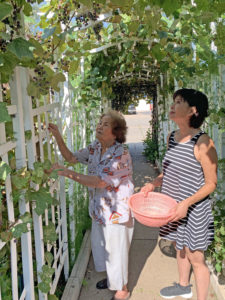By Annie Calovich
While many Wichitans have recently been battling armyworms that have eaten their front lawns brown, Mui Peng has been oblivious to their upheaval amid a brimming diversity of herbs, vegetables, fruits and flowers burying her Midtown front yard in green.
In fact, when asked about insects bugging her plants, her daughter Minh goes on the hunt to find some evidence, finally spying some grasshopper holes in a few leaves, but that’s about it. Minh Peng burns anti-mosquito coils to keep the skeeters off her mother, who is 90, but her mother doesn’t like the burning citronella smell.
“I don’t worry about mosquitoes,” Mui says through her daughter’s translation. “I bite ’em back.”
The alchemy of mint basil, Thai peppers, lemongrass and scads of other aromatic plants must be the recipe for keeping bugs at bay in this organic garden. That and the constant nurturing of the plants by a woman originally from Laos who has created a healthy, old-fashioned neighborhood gathering spot in what used to be a typical American monoculture of a front lawn.
Four-time refugee
Mother and daughter have lived next door to each other in a duplex on North Fairview for 30 years, and Minh owns several rental properties in the vicinity where the garden expands to exotic fruit trees ranging from jujube to Asian pear to donut peach. Mui was born in 1930 and is a four-time refugee who finally made it to the United States in 1975, when Minh was 10 years old. Mui witnessed famine, lived through bombings and endured the loss of freedoms and homes. She speaks Vietnamese but makes frequent use of the words “thank you” in English.
“I grew up with seeing my friends and family going through hardships with the war and how to survive,” Mui says. She didn’t start gardening until about 12 years ago, when easing family demands gave her time. She has three children, four grandchildren and two great-grandchildren.
“It comes naturally. It’s a pretty simple thing to do,” she says of gardening. “I grew up seeing other people planting.”
Her garden is an adventure and an experiment, a constant source of wonderment and discovery. First came the addition of a white picket, then the removal of a declining tree, which opened the yard to full sun.
‘Which one is that?’
“She started out with flowers … and now she’s like, ‘We might as well get herbs going and cucumbers going and tomatoes, okra,’” Minh says. “It’s hard to keep up with what she’s deciding to plant next. She would eat the fruit from the store and plant the seeds, and it grows. We’ve got chives growing like crazy, garlic, Asian spices.
“Cantaloupe, cherry — she puts them down and then she’s trying to figure out which one is that?” when the plants finally appear.
The garden is economical and elemental. At one time there was a path through the yard, but it has become rough-and-tumble, with invasive mint growing alongside refined clematis. An arbor of grapes creates a shady tunnel leading up the front walk.
“Everything is the same things I used in my country: basil, lemon balm, mint,” Mui says.
The Pengs get some seed from friends, and Mui tends to plant stalks and seeds from foods she gets at Thai Binh Supermarket on West 21st Street.
Friends and neighbors
Mui herself doesn’t cook but eats the leaves of herbs on salads. But she grows as much or maybe even more for others than she does for herself. Her basil tops one friend’s pho, and her mint is tucked into another’s spring rolls. She gives her bounty to neighbors and friends, who often stop by.
“We’ve got great neighbors here,” Mui says. “Everyone’s like a big family. … I enjoy the neighbors coming around. People walk by in the morning and admire. That makes me happy.”
They will find Mui out early, watering. Minh has set up a few different hoses so her mother doesn’t have to drag them far. A big black-and-white cat named Tommy keeps tabs on what’s going on.
Friends also take bunches of herbs from the yard to use for medicinal purposes. The herbs seem to work as a preventative for Mui.
“I don’t have any pain. I eat a lot of vegetables. I exercise every day.” The gardening gives her the chance to get up and down from a small plastic child’s chair that she moves around the yard, and she rides an exercise bicycle set up on the front screened-in porch that gives her a good view of the garden.
Turning her front yard into a garden isn’t the only unconventional thing Mui has done. She draws birds to it by scattering not seed but cooked rice in water on the ground around her plants. She says the rice also helps feed the plants.
So do egg shells, which spill out of a plastic grocery bag and get put on vegetables and fruits maybe once a month when they start to flower. When Mui plants, she works in Miracle-Gro potting soil and tucks peat moss around plants as a fertilizer. All while wearing gloves, of course. She keeps her fingernails beautifully manicured.
The basil reseeds, and the mint spreads, and early spring sees Mui out moving the new plants to the right places for the growing season.
“I’m happy. It’s like tending to it and seeing how it grows. I didn’t realize how one little pepper could create over 100 plants.”
‘It’s rewarding’
That means she not only gives out produce, she gives out plants. When cold weather threatens, and the pepper plants are still popping with peppers, she digs up the plants, pots them up and gives them away. The mail carrier will be one recipient. Mui also puts peppers through a food processor and freezes them. In the winter, when some of those peppers can provide a warming reminder of summer, she knits instead of gardens.
“She shares the other seeds when it’s ripe,” her daughter says. “So everyone she knows has more plants.”
The garden creates a healthy circle of life both physically and emotionally. Mui’s social front yard allows her to reminisce with others of her generation, “and the younger generations like her stories,” her daughter says.
“It’s rewarding that you can share,” Mui says. “It makes me feel good that people enjoy it.”
Contact Annie Calovich at acalovich@att.net.











